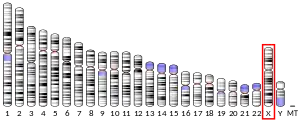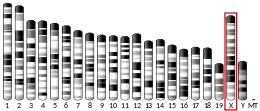| DACH2 | |||||||||||||||||||||||||||||||||||||||||||||||||||
|---|---|---|---|---|---|---|---|---|---|---|---|---|---|---|---|---|---|---|---|---|---|---|---|---|---|---|---|---|---|---|---|---|---|---|---|---|---|---|---|---|---|---|---|---|---|---|---|---|---|---|---|
| Identifiers | |||||||||||||||||||||||||||||||||||||||||||||||||||
| Aliases | DACH2, dachshund family transcription factor 2 | ||||||||||||||||||||||||||||||||||||||||||||||||||
| External IDs | OMIM: 300608 MGI: 1890446 HomoloGene: 33472 GeneCards: DACH2 | ||||||||||||||||||||||||||||||||||||||||||||||||||
| |||||||||||||||||||||||||||||||||||||||||||||||||||
| |||||||||||||||||||||||||||||||||||||||||||||||||||
| |||||||||||||||||||||||||||||||||||||||||||||||||||
| |||||||||||||||||||||||||||||||||||||||||||||||||||
| |||||||||||||||||||||||||||||||||||||||||||||||||||
| Wikidata | |||||||||||||||||||||||||||||||||||||||||||||||||||
| |||||||||||||||||||||||||||||||||||||||||||||||||||
Dachshund homolog 2 is a protein that in humans is encoded by the DACH2 gene.[5]
Function
This gene is one of two genes which encode a protein similar to the Drosophila protein dachshund, a transcription factor involved in cell fate determination in the eye, limb and genital disc of the fly. The encoded protein contains two characteristic dachshund domains: an N-terminal domain responsible for DNA binding and a C-terminal domain responsible for protein-protein interactions. This gene is located on the X chromosome and is subject to inactivation by DNA methylation. The encoded protein may be involved in regulation of organogenesis and myogenesis, and may play a role in premature ovarian failure.
References
- 1 2 3 GRCh38: Ensembl release 89: ENSG00000126733 - Ensembl, May 2017
- 1 2 3 GRCm38: Ensembl release 89: ENSMUSG00000025592 - Ensembl, May 2017
- ↑ "Human PubMed Reference:". National Center for Biotechnology Information, U.S. National Library of Medicine.
- ↑ "Mouse PubMed Reference:". National Center for Biotechnology Information, U.S. National Library of Medicine.
- ↑ Multiple transcript variants encoding different isoforms have been found for this gene. "Entrez Gene: Dachshund homolog 2 (Drosophila)". Retrieved 2012-04-15.
Further reading
- Bione S, Rizzolio F, Sala C, Ricotti R, Goegan M, Manzini MC, Battaglia R, Marozzi A, Vegetti W, Dalprà L, Crosignani PG, Ginelli E, Nappi R, Bernabini S, Bruni V, Torricelli F, Zuffardi O, Toniolo D (Dec 2004). "Mutation analysis of two candidate genes for premature ovarian failure, DACH2 and POF1B". Human Reproduction. 19 (12): 2759–66. doi:10.1093/humrep/deh502. PMID 15459172.
- Poulin F, Nobrega MA, Plajzer-Frick I, Holt A, Afzal V, Rubin EM, Pennacchio LA (Jun 2005). "In vivo characterization of a vertebrate ultraconserved enhancer". Genomics. 85 (6): 774–81. doi:10.1016/j.ygeno.2005.03.003. PMID 15885503. S2CID 21888183.
- Davis RJ, Shen W, Sandler YI, Heanue TA, Mardon G (Apr 2001). "Characterization of mouse Dach2, a homologue of Drosophila dachshund". Mechanisms of Development. 102 (1–2): 169–79. doi:10.1016/s0925-4773(01)00307-0. PMID 11287190.
- Aikawa Y, Nguyen LA, Isono K, Takakura N, Tagata Y, Schmitz ML, Koseki H, Kitabayashi I (Sep 2006). "Roles of HIPK1 and HIPK2 in AML1- and p300-dependent transcription, hematopoiesis and blood vessel formation". The EMBO Journal. 25 (17): 3955–65. doi:10.1038/sj.emboj.7601273. PMC 1560355. PMID 16917507.
- Prueitt RL, Chen H, Barnes RI, Zinn AR (2002). "Most X;autosome translocations associated with premature ovarian failure do not interrupt X-linked genes". Cytogenetic and Genome Research. 97 (1–2): 32–8. doi:10.1159/000064052. PMID 12438735. S2CID 8347100.
This article is issued from Wikipedia. The text is licensed under Creative Commons - Attribution - Sharealike. Additional terms may apply for the media files.



